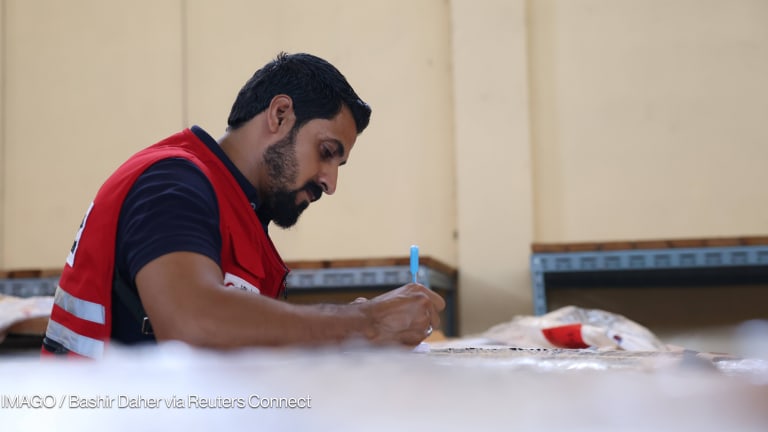
What does it mean to make a humanitarian response local? A year on from the “Grand Bargain,” Australia is attempting to shift from discussing localization to implementing it. The transition is not without challenges.
At a workshop on the topic held in Melbourne on June 20, the Australian Red Cross, Department of Foreign Affairs and Trade and Australian Council for International Development asked Australia’s development sector to help identify definitions, approaches and monitoring and evaluation for localization specific to the Indo-Pacific, a region more affected by natural disasters than protracted crises.
The discussion highlighted the issues donors may face in implementation. Australia is one of the more advanced signatories in implementing localization, which has allowed them to become a vocal advocate for strengthening the framework. It also means Australia’s experience may offer lessons for other donors moving forward.
At the June Grand Bargain meeting in Geneva, Australia unsuccessfully argued for donors to condense discussions into two thematic streams, rather than the current ten. DFAT said they will push for greater action on integration and support outreach to nonsignatories.
See more related topics:
► Dispute over 'Grand Bargain' localization commitments boils over
► ARC looks to improve localization in humanitarian response
► Opinion: Yes, the humanitarian sector really is going to localize
DFAT also expressed concern that the focus has been largely on process rather than implementation, despite 2020 targets looming just around the corner. Donors have so far neglected to address institutional capacities for localization, to remove barriers facing local groups and to improve coordination mechanisms, DFAT argued.
Moving forward, Australia will promote the implementation of Grand Bargain commitments on the ground through existing systems and formal pilots. DFAT will also be dealing with internal system challenges. Their existing aid management tool, called AidWorks, is unlikely to capture necessary information for monitoring and evaluation of localization in humanitarian responses.
What is localization?
From the perspective of Pacific humanitarian responses, the definition of localization itself was an important topic of debate and discussion. The consensus was that it needed to change.
Under the Grand Bargain Commitment, localization is defined as “making principled humanitarian action as local as possible and as international as necessary … engaging with local and national responders in a spirit of partnership and aiming to reinforce rather than replace local and national capacities.”
DFAT has said they will report progress against this global definition, but also seek to shape it.
For Australia, localization means recognizing, respecting and strengthening leadership and decision making by local and national actors in humanitarian action, in order to better address the needs of affected populations. The directness of funding is less of a concern than the ability to enable local decision making.
That definition is similar to one used by the Australian Red Cross in its research: “A process of recognizing, respecting and strengthening the independence of leadership and decision-making by national actors in humanitarian action, in order to better address the needs of affected populations.”
Pacific challenges in localization
Highlights from Australia’s response to Tropical Cyclone Pam in Vanuatu demonstrate the challenge of directing international assistance toward local resources following a natural disaster. A flood of support can easily overwhelm capacity.
Thanks but no thanks: Unwanted goods flood disaster-struck developing countries
High heels, handbags, chainsaws and carpets — these are just some of the goods donated to Vanuatu and Fiji following recent natural disasters. A new report from Red Cross Australia reveals the financial and physical burdens and waste caused by these unrequested donated goods.
Research conducted for the Australian Red Cross and DFAT by Centre for Humanitarian Leadership, Fiji National University and Humanitarian Advisory Group highlighted the degree of frustration the Pacific Island government and local organizations felt following a natural disaster. The study highlighted a feeling that international organizations and donors were not ready to walk the talk of shifting resources.
Initial findings presented by Kate Sutton, director of the Humanitarian Advisory Group, demonstrated the need for attitude change among international organizations providing disaster support. Pacific Islanders interviewed for the study wanted to shift more control of operations to local communities — including human resources, finance, relations and capacity development.
Railala Nakabea-Tavui, a lead researcher in the project for Fiji National University, was surprised by the findings. She told Devex that initial interviews with INGOs showed that they believed that they were doing localization well. From the perspective of local players, however, INGOs had maintained control of decisions affecting the response.
The research, Nakabea-Tavui said, gave her confidence that local organizations were thinking objectively about their capacity to respond to disasters by identifying the risks of taking a greater leadership role. “To me it is positive because when it comes to our dependency on handouts and funds, they can look out of themselves and build their own capacity,” she said.
What happens after 2020 if targets are not reached?
With 2020 fast approaching, participants expressed concern that the target of directing 25 percent of humanitarian funding to local and national responders would not be met. For DFAT, this is less of a concern than getting a real framework in place that would support local players, encourage better use of resources and funds as well as bring new players into humanitarian responses.
DFAT is holding a series of workshops in the Asia-Pacific region to seek recommendations for how to implement localization. Priority topics include: How to build flexibility into development projects so that funds can be reallocated if not spent by the end of the year; how to encourage partners to shift resources locally; and how to ensure adequate preparedness for crises.
The Red Cross echoed the view that proper implementation is more important than numbers in a report. “The Grand Bargain was a point in time where we had political will that signalled and acknowledged the need for change,” Peter Walton, international director for the Australian Red Cross, told Devex.
“I still see it as a window of opportunity to try to do things differently. Localization, while we have talked about it for years, is a paradigm shift about changing the interface between international and local humanitarian action. It is not a tweaking of the current system — it is suggestive of a fundamental shift. And this is what we want to see.”
Read more international development news online, and subscribe to The Development Newswire to receive the latest from the world’s leading donors and decision-makers — emailed to you free every business day.








